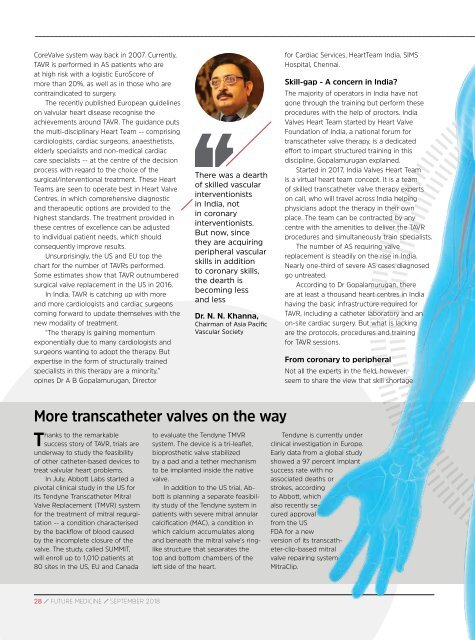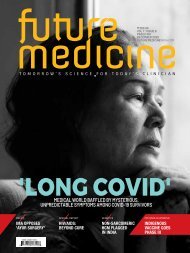FM SEPTEMBER 2018 ISSUE - digital edition
Create successful ePaper yourself
Turn your PDF publications into a flip-book with our unique Google optimized e-Paper software.
CoreValve system way back in 2007. Currently,<br />
TAVR is performed in AS patients who are<br />
at high risk with a logistic EuroScore of<br />
more than 20%, as well as in those who are<br />
contraindicated to surgery.<br />
The recently published European guidelines<br />
on valvular heart disease recognise the<br />
achievements around TAVR. The guidance puts<br />
the multi-disciplinary Heart Team -- comprising<br />
cardiologists, cardiac surgeons, anaesthetists,<br />
elderly specialists and non-medical cardiac<br />
care specialists -- at the centre of the decision<br />
process with regard to the choice of the<br />
surgical/interventional treatment. These Heart<br />
Teams are seen to operate best in Heart Valve<br />
Centres, in which comprehensive diagnostic<br />
and therapeutic options are provided to the<br />
highest standards. The treatment provided in<br />
these centres of excellence can be adjusted<br />
to individual patient needs, which should<br />
consequently improve results.<br />
Unsurprisingly, the US and EU top the<br />
chart for the number of TAVRs performed.<br />
Some estimates show that TAVR outnumbered<br />
surgical valve replacement in the US in 2016.<br />
In India, TAVR is catching up with more<br />
and more cardiologists and cardiac surgeons<br />
coming forward to update themselves with the<br />
new modality of treatment.<br />
“The therapy is gaining momentum<br />
exponentially due to many cardiologists and<br />
surgeons wanting to adopt the therapy. But<br />
expertise in the form of structurally trained<br />
specialists in this therapy are a minority,”<br />
opines Dr A B Gopalamurugan, Director<br />
There was a dearth<br />
of skilled vascular<br />
interventionists<br />
in India, not<br />
in coronary<br />
interventionists.<br />
But now, since<br />
they are acquiring<br />
peripheral vascular<br />
skills in addition<br />
to coronary skills,<br />
the dearth is<br />
becoming less<br />
and less<br />
Dr. N. N. Khanna,<br />
Chairman of Asia Pacific<br />
Vascular Society<br />
for Cardiac Services, HeartTeam India, SIMS<br />
Hospital, Chennai.<br />
Skill-gap - A concern in India?<br />
The majority of operators in India have not<br />
gone through the training but perform these<br />
procedures with the help of proctors. India<br />
Valves Heart Team started by Heart Valve<br />
Foundation of India, a national forum for<br />
transcatheter valve therapy, is a dedicated<br />
effort to impart structured training in this<br />
discipline, Gopalamurugan explained.<br />
Started in 2017, India Valves Heart Team<br />
is a virtual heart team concept. It is a team<br />
of skilled transcatheter valve therapy experts<br />
on call, who will travel across India helping<br />
physicians adopt the therapy in their own<br />
place. The team can be contracted by any<br />
centre with the amenities to deliver the TAVR<br />
procedures and simultaneously train specialists.<br />
The number of AS requiring valve<br />
replacement is steadily on the rise in India.<br />
Nearly one-third of severe AS cases diagnosed<br />
go untreated.<br />
According to Dr Gopalamurugan, there<br />
are at least a thousand heart centres in India<br />
having the basic infrastructure required for<br />
TAVR, including a catheter laboratory and an<br />
on-site cardiac surgery. But what is lacking<br />
are the protocols, procedures and training<br />
for TAVR sessions.<br />
From coronary to peripheral<br />
Not all the experts in the field, however,<br />
seem to share the view that skill shortage<br />
More transcatheter valves on the way<br />
Thanks to the remarkable<br />
success story of TAVR, trials are<br />
underway to study the feasibility<br />
of other catheter-based devices to<br />
treat valvular heart problems.<br />
In July, Abbott Labs started a<br />
pivotal clinical study in the US for<br />
its Tendyne Transcatheter Mitral<br />
Valve Replacement (TMVR) system<br />
for the treatment of mitral regurgitation<br />
-- a condition characterised<br />
by the backflow of blood caused<br />
by the incomplete closure of the<br />
valve. The study, called SUMMIT,<br />
will enroll up to 1,010 patients at<br />
80 sites in the US, EU and Canada<br />
to evaluate the Tendyne TMVR<br />
system. The device is a tri-leaflet,<br />
bioprosthetic valve stabilized<br />
by a pad and a tether mechanism<br />
to be implanted inside the native<br />
valve.<br />
In addition to the US trial, Abbott<br />
is planning a separate feasibility<br />
study of the Tendyne system in<br />
patients with severe mitral annular<br />
calcification (MAC), a condition in<br />
which calcium accumulates along<br />
and beneath the mitral valve’s ringlike<br />
structure that separates the<br />
top and bottom chambers of the<br />
left side of the heart.<br />
Tendyne is currently under<br />
clinical investigation in Europe.<br />
Early data from a global study<br />
showed a 97 percent implant<br />
success rate with no<br />
associated deaths or<br />
strokes, according<br />
to Abbott, which<br />
also recently secured<br />
approval<br />
from the US<br />
FDA for a new<br />
version of its transcatheter-clip-based<br />
mitral<br />
valve repairing system<br />
MitraClip.<br />
28 / FUTURE MEDICINE / <strong>SEPTEMBER</strong> <strong>2018</strong>


















